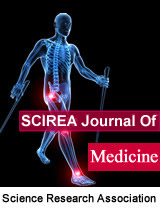Transcatheter Aortic Valve Implantation Complicated With Asymptomatic Left Ventricular Dissection and Conservative Management
DOI: 10.54647/pm31118 100 Downloads 13876 Views
Author(s)
Abstract
Over the last decade, transcatheter aortic valve implantation (TAVI) has emerged as a valuable and safe alternative to surgical aortic valve replacement (SAVR), nevertheless, major complications still occur in ≤6% to 8% of cases. Such major complications have been associated with a 2- to 3-fold increase in 30-day mortality. 1 We describe a case of TAVI complicated with asymptomatic left ventricular dissection in whom a transcatheter aortic valve was successfully implanted but on the control Echcoardiogram, free wall dissection was observed. No segmentary movement disorders were observed, neither EKG changes. Conservative management was opted with no further complications. The 30-day follow up revealed a left-ventricle aneurysm but improvement to functional class I was seen. The patient 12 months post-TAVR remains asymptomatic and on Class I NYHA. No changes on gradient, ejection fraction or paravalvular leak have been registered.The management of left ventricular injuries is highly specific and depends on the type of lesion, the wound location, the patient’s clinical status, and the patient’s overall health status and ability to tolerate an open repair. We can conclude that it is feasible to maintain a conservative and expectant management in this type of complications as long as pseudoaneurysm or pericardial effusion are ruled out and the patient remains hemodynamically stable.
Keywords
TAVI, ventricular dissection, complications, treatment
Cite this paper
Allende-Carrera, Ricardo, Aguilar-Rojas, Luis Antonio,
Transcatheter Aortic Valve Implantation Complicated With Asymptomatic Left Ventricular Dissection and Conservative Management
, SCIREA Journal of Medicine.
Volume 5, Issue 2, April 2021 | PP. 11-15.
10.54647/pm31118
References
| [ 1 ] | Langer NB, Hamid NB, Nazif TM, Khalique OK, Vahl TP, White J, Terre J, Hastings R, Leung D, Hahn RT, et al. Injuries to the aorta, aortic annulus, and left ventricle during transcatheter aortic valve replacement: management and outcomes. Circ Cardiovasc Interv. 2017;10:e004735. |
| [ 2 ] | Pliam MB, Sternlieb JJ. Intramyocardial dissecting hematoma: An unusual form of subacute cardiac rupture. J Card Surg. 1993;8:628–37. |
| [ 3 ] | Nagy A, Khan ZI, Al Sayari SY, Aboushaeshae AS, Natarajan R. Asymptomatic left ventricular dissection. J Cardiovasc Echography 2017;27:62-3. |
| [ 4 ] | Agrawal Y, Kalavakunta J, Saltiel F, Gupta V. Left ventricular wall rupture and cardiac tamponade during transcatheter aortic valve replacement. Am J Respir Crit Care Med. 2016;193:A6964–A6964. |
| [ 5 ] | Eggebrecht H, Vaquerizo B, Moris C, Bossone E, Lammer J, Czerny M et al. Incidence and outcomes of emergent cardiac surgery during trans- femoral transcatheter aortic valve implantation (TAVI): insights from the European Registry on Emergent Cardiac Surgery during TAVI (EuRECS- TAVI). Eur Heart J 2018;39:676–84. |
| [ 6 ] | Percutaneous interventional cardiovascular medicine – The PCR-EAPCI Textbook. Transcatheter aortic valve implantation. Nicolo Piazza, Alain Cribier, Rodney De Palma. |
| [ 7 ] | Nielsen NE, Baranowska J, Bramlage P, Baranowski J. Minimizing the risk for left ventricular rupture during transcatheter aortic valve implantation by reducing the presence of stiff guidewires in the ventricle. Interact CardioVasc Thorac Surg 2019;29:365–70. |
| [ 8 ] | Pliam MB, Sternlieb JJ. Intramyocardial dissecting hematoma: An unusual form of subacute cardiac rupture. J Card Surg 1993;8:628-37. |
| [ 9 ] | Galache Osuna JG, Marquina Barcos A, Cay Diarte E, Sánchez-Rubio Lezcano J, Salazar González JJ, Placer Peralta LJ. Conservative management of a post infarction intramyocardial dissecting hematoma. Rev Esp Cardiol 2003;56:735-7. |

